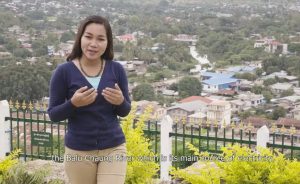Yesterday, a special court in military-ruled Myanmar sentenced a journalist associated with the British broadcaster BBC to three years in prison with hard labor for her reporting following the military coup of February 2021. Htet Htet Khine was convicted of “incitement” and “illegal association” for her reporting work, Radio Free Asia reported, citing the journalist’s family members and legal team.
From 2016 to 2020, Htet Htet Khine presented a Burmese-language program called “Khan Sar Kyi” (“Feel It”) for BBC Media Action, the British broadcaster’s international development arm. The program focused on telling the stories of those on Myanmar’s political and geographic margins, with a particular focus on the impacts of country’s long-running civil wars. (See, for instance, this report from 2020 on refugees living in Mae Hong Son, Thailand.)
Htet Htet Khine was arrested along with the columnist and journalist Sithu Aung Myint at an apartment in Yangon, in August 2021, six months after the coup. She still faces an additional charge of unlawful association under which she could receive up to another three years in prison. Meanwhile, Sithu Aung Myint, a columnist for Frontier Myanmar and a commentator for the U.S.-funded broadcaster Voice of America, remains in pre-trial detention on charges of spreading false news and sedition.
Among the maelstrom of crises that have engulfed Myanmar since last February’s coup d’etat, the plight of the country’s press can easily be overlooked. The military takeover almost instantly reversed the opening of the media environment that had accompanied the limited political reforms of the 2010s. The country’s independent journalists have since been forced back into exile or underground, resuscitating the sub rosa reporting techniques honed during decades of military rule prior to 2011.
In a statement yesterday, Richard Lace, Director of Programmes for BBC Media Action, said that the organization was “alarmed” to learn of Htet Htet Khine’s sentencing and said it remained “concerned for her safety and well-being.”
“This, and other detentions of media workers in the country, runs counter to basic principles of human rights and freedom of expression,” Lace said.
According to the Associated Press, the military-backed State Administration Council has to date forced at least 11 media outlets to shut down and arrested about 142 journalists, 57 of whom remain in detention awaiting charges or trial.
Citing these numbers has a rote quality that does not do justice to the junta’s attempts to quash independent journalism, nor the full horror experienced by those who have fallen into its clutches.
In a brave first-person account published this week, Ye Mon, a journalist for Frontier Myanmar, recounts the nightmare that he underwent after being detained by soldiers at Yangon International Airport last December, when he returned to the country to care for a sick relative. In the article, he describes being taken to a black site interrogation center in the city, where he was subject to repeated physical and sexual abuse, including rape.
“I decided to write this because I wanted the world to know that the use of sexual violence is indeed routine, even if it meant reliving my experience over and over again,” he wrote.
“I believe that the use of rape and other forms of sexual abuse is not just a torture method designed to get information out of detainees,” Ye Mon added. “The soldiers see the people as their enemies and inflict sexual violence as a form of punishment, and to show that they have the power to do whatever they want.”































